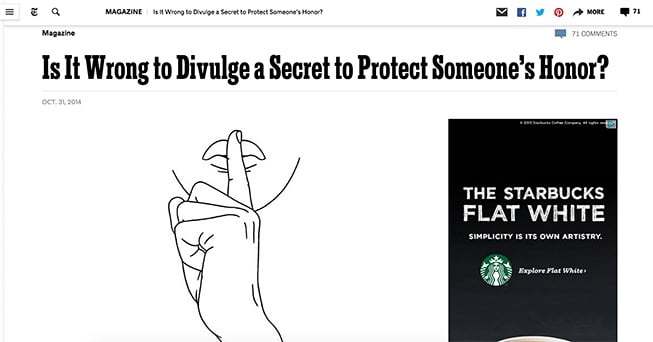Origin:
I’m an expat living in a country where H.I.V./AIDS is a severe taboo. My friend, also an expat, was diagnosed with H.I.V. while living here. She received almost no support or therapy of any form. Her attitude and behavior changed as she became ill, and she alienated and frustrated mutual friends. While I knew the truth, I was entrusted with her secret and stayed silent when I heard people bad-mouth her. Now that she has returned home, I feel compelled to defend her honor — I believe she was judged too harshly given unfathomable pressure and circumstances. But I also feel obligated to hold on to her secret. Is it acceptable to divulge a secret to protect someone’s honor? NAME WITHHELD, CAIRO.
What makes this question difficult is the lack of clarity over what your friend meant when she swore you to secrecy. Did she expect you literally to tell no one about this, for the remainder of your life? Would she classify even this anonymous letter as a breach of that commitment? Or did she simply mean she didn’t want your circle of acquaintances to know of this, at least while she was still in the country? Are you absolutely certain you’re the only person who knows this, or might other members of your group of friends be in the same awkward position? I’m going to work from the assumption that your friend intended to place the most obdurate conditions on you — she told you about her illness with the understanding that you were never to speak of this to anyone, under any circumstances, in the present or in the future. And if that is what you agreed to, the secret should not be divulged, even if your motive is to defend her from criticism.
Divulge something is to give somebody information that is supposed to be secret.
1. Police refused to divulge the identity of the suspect.
2. The plans must not be divulged to anyone.
3. None of them would divulge the winner from last season.




This Post Has 0 Comments